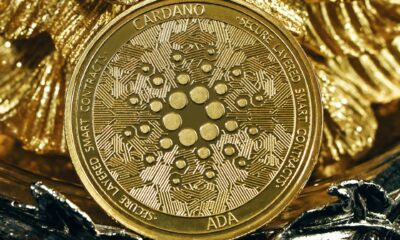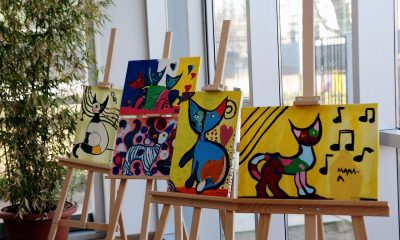Crowdfunding
The Swiss startup ArtID closes its first IPO with a collection of €1.26 million
The company ArtID has recently closed its first STO, with a collection of $1.54 million (€1.26 million). For the transaction, ArtID had chosen Kreston as advisor and Stokr, based in Luxembourg, as platform to host the STO. Since June 2018, the company allows to digitally certify artworks on the Ethereum blockchain. The ArtID marketplace hosts more than 1,000 works

The Swiss company with an Italian heart, ArtID has closed its first STO (Security Token Offering), with a collection of $1.54 million (€1.26 million). This was announced by the company in recent days. The STO had been launched in April 2020 with a maximum collection of $6.1 million (€5 million). The funds raised with the STO will be used to enhance ArtID’s marketplace through the purchase of 6,000 limited edition art photos and to finance its business plan.
For the transaction, ArtID had chosen Kreston as advisor and Stokr, based in Luxembourg, as the platform to host the STO. The STO Stokr allows the placement of digital securities, i.e. securities issued through tokens that identify shares of the issuing company and entitle to either a share of the turnover (revenue sharing) or a share of the profits (profit sharing). The disbursement of any payments is regulated by a “smart contract” connected to the token and relies on an account managed by the French institute Lemonway (which also relies on many lending crowdfunding platforms, including in Italy).
If you want to find more details about the ArtID collection round and how the company allows to digitally certify artworks on the Ethereum blockchain, download for free the Born2Invest mobile app. Our companion app brings you the most important business news in the world, so you can stay informed.
ArtID was founded in 2016 in Lugano by Stefano Vablais (CEO) and Luca Muttoni
Since June 2018, the company allows to digitally certify artworks on the Ethereum blockchain. In ArtID, as stated on the site, the digital certificate of a work of art is a “zipper” folder containing all the documentation related to it, such as high-resolution photos, authentication of the author, documents related to any archiving, evidence of exhibitions where the work has been exhibited, indications of relevant publications, extracts from publications that contain information about the work.
The certificate may contain information on the author, historical periods, information on current and previous ownership, the place where the work is physically kept, prices, deeds of sale declarations, and expertise. The “zipper” folder is signed on blockchain. The content of the certificate is not modifiable neither in its contents nor for the information related to the date of creation and update.
The ArtID marketplace hosts more than 1,000 works, all of which are compulsorily equipped with a digital certificate, and also has integrated logistics and payment system. For each registration to the site, the company provides 50 free ArtID tokens, worth $0.67 (€0.55) each, which can be immediately used to test the platform and equip one’s works with the digital certificate.
Blockchain for artworks has already been tested by artists, art galleries and auction houses. These include Christie’s, which in October 2018 had decided to experiment with the token in partnership with startup Artory. Each collector is given an electronic card that allows personalized access to the database that essentially contains the information in the catalog. In addition, through the use of blockchain technology, Christie’s can make available to the customer a digital certificate, cryptographically signed, as a tool to validate the veracity of the information about the works provided.
__
(Featured image by mollyroselee via Pixabay)
DISCLAIMER: This article was written by a third party contributor and does not reflect the opinion of Born2Invest, its management, staff or its associates. Please review our disclaimer for more information.
This article may include forward-looking statements. These forward-looking statements generally are identified by the words “believe,” “project,” “estimate,” “become,” “plan,” “will,” and similar expressions. These forward-looking statements involve known and unknown risks as well as uncertainties, including those discussed in the following cautionary statements and elsewhere in this article and on this site. Although the Company may believe that its expectations are based on reasonable assumptions, the actual results that the Company may achieve may differ materially from any forward-looking statements, which reflect the opinions of the management of the Company only as of the date hereof. Additionally, please make sure to read these important disclosures.
First published in Crowdfunding buzz, a third-party contributor translated and adapted the article from the original. In case of discrepancy, the original will prevail.
Although we made reasonable efforts to provide accurate translations, some parts may be incorrect. Born2Invest assumes no responsibility for errors, omissions or ambiguities in the translations provided on this website. Any person or entity relying on translated content does so at their own risk. Born2Invest is not responsible for losses caused by such reliance on the accuracy or reliability of translated information. If you wish to report an error or inaccuracy in the translation, we encourage you to contact us.

-

 Biotech1 week ago
Biotech1 week agoEcnoglutide Shows Promise as Next-Generation Obesity Treatment
-

 Business6 days ago
Business6 days agoThe TopRanked.io Weekly Digest: What’s Hot in Affiliate Marketing [PureVPN Affiliates Review]
-

 Cannabis2 weeks ago
Cannabis2 weeks agoIs Aurora Cannabis Stock a Risk Worth Taking?
-

 Crowdfunding1 day ago
Crowdfunding1 day agoPMG Empowers Italian SMEs with Performance Marketing and Investor-Friendly Crowdfunding

























